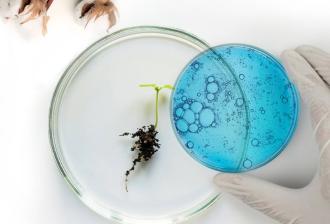Lab-grown cotton is entering the commercial market for the first time, potentially heralding a disruption of the market for the world’s “dirtiest” crop.
The challenge: Cotton is one of the most widely used, versatile materials in the world, which is why 29 million tons of the fluff are produced every year — that’s about the same weight as 1,000 Statues of Liberty. However, all that cotton comes at a cost beyond what consumers pay.
Not only are cotton plants one of the most water-intensive crops to grow, they’re also among the most chemically-intensive — 6% of the world’s pesticides and 16% of its insecticides go toward cotton production, despite the crop occupying just 2.5% of the world’s farmland, according to the Environmental Justice Foundation.
Those chemicals may threaten the health of those who work or live near cotton farms, and many workers have literally no choice but to endure the risk because cotton in many places is produced using slave and child labor.
Galy says its lab-grown cotton requires 80% less water than traditional cotton production.
Lab-grown cotton: In 2019, entrepreneur Luciano Bueno founded cellular agriculture startup Galy to minimize the negative environmental and social impact of traditional agriculture, starting with cotton production, by replacing the farm with the science lab.
To create its first product, Literally Cotton, Galy places cells from cotton plants in tanks called “bioreactors.” By precisely controlling the conditions inside the bioreactor, Galy coaxes the cells into growing into cotton fibers that can then be harvested, dried, and used like any other cotton.
According to Galy, this process uses 80% less water than traditional cotton production, and because it takes place in a lab, there’s no need for pesticides or insecticides. Production can also happen year round and under any weather conditions, helping keep costs and yields stable.
“We see it as an innovation that will change the concept of cotton production.”
Yasuhiro Kunieda
What’s new? Galy has now announced a 10-year, $50 million partnership with Suzuran Medical Inc., a Japanese manufacturer that plans to use the startup’s lab-grown cotton in a variety of products, including gauze and cotton sheets.
“We believe that the introduction of this technology to the market will aid in solving the problems of climate impact and child labor caused by cotton cultivation,” Yasuhiro Kunieda, Suzuran’s president, told Forbes.
“It also has great potential from a business standpoint, and we see it as an innovation that will change the concept of cotton production,” he continued.
The market: Suzuran has already evaluated Galy’s lab-grown cotton through a proof-of-concept project, so it must believe the material could work for its products. However, Kunieda told Forbes it is possible that consumer acceptance will be an issue.
He didn’t expand on why people might not take to the material, but as of 2020, Galy expected its lab-grown cotton to cost about as much as traditionally produced “high-quality cotton” — which might mean that its cost won’t be competitive for typically low-cost cotton products.
Looking ahead: The 10-year contract between Susuran and Galy won’t kick off until the startup opens its first commercial facility — Bueno told Forbes he anticipates that happening “within the next few years.” In the meantime, Galy is already developing its next two products.
“With all our success in our product development, solidifying our partnership with Suzuran, and the industry interest across products, we’re in a very exciting spot right now,” said Bueno.
The big picture: Galy would need to seriously scale up to even make a dent in the world’s cotton production, and even if lab-grown cotton could fully supplant the standard kind, that might have other consequences, including a loss of income for 100 million families worldwide.
Ultimately, cleaning up the world’s dirtiest crop isn’t going to be easy, but consumers can do their part by buying products from brands that use ethically produced, sustainable cotton whenever possible — and perhaps taking a chance on lab-grown cotton once it’s available.
We’d love to hear from you! If you have a comment about this article or if you have a tip for a future Freethink story, please email us at [email protected].






